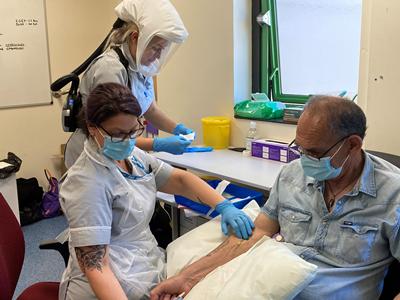Researchers pilot new tests for the early detection of lung cancer in Southampton

The first participants have taken part in a new research trial that aims to save lives by improving the early diagnosis of lung cancer.
People attending the NHS Targeted Lung Health Checks in Southampton are being invited to take part in the iDx Lung trial, which will offer new types of test to ten thousand people over the next three years.
iDx Lung is a collaboration between the Cancer Research UK Southampton Clinical Trials Unit at the University of Southampton, the University of Leeds and healthcare and diagnostic companies, and aims to find new ways to detect lung cancer at an early stage when it is more treatable.
Professor Peter Johnson, Director of the CRUK Southampton Centre and Chief Investigator of trial, said:
“We know that lung cancer can be treated successfully if we catch it early, but too often it can go unnoticed and is then picked up at a late stage when treatment options are limited. By bringing some of the latest molecular technology to this problem, we hope that we can find better ways to detect lung cancer in its early stages and make sure people have the best chance of a cure.”
The trial team are working alongside NHS England’s Targeted Lung Health Checks programme and the Yorkshire Lung Screening Trial. People at high risk of lung cancer are being invited to attend a CT scanning unit. The iDx Lung trial will ask 10,000 people who attend scans across Hampshire and Yorkshire to also give a nasal swab and a blood sample.
Victoria Goss, Programme Manager for iDx lung at the Southampton Clinical Trials Unit, said:
“These samples will be analysed for changes that could indicate the early signs of cancer developing. The aim is to determine whether using simple biological tests alongside the Targeted Lung Health Check programme can help increase diagnosis rates in people with the very early signs of lung cancer, so they can begin treatment quickly when it is far more likely to be successful.”
Brian Gray, 72, from Southampton, agreed to take part in the iDx Lung trial after being invited to the Targeted Lung Health Check.
“I came to the scan to find out what’s wrong with me,” says Brian, “and if there’s nothing, at least doing this will help someone else, which feels really good. I wasn’t sure what I was letting myself in for at first, but the team explained everything to me really well. Having the samples taken was very straight-forward, no problems at all. So, if anyone else is invited to come along, don’t be worried by it.
“At my age I feel that being part of research is a good thing. If there’s anything in my body that can help someone else, then fair play!”
The trial is currently taking place at the Royal South Hampshire Hospital, but in the autumn it will move to a mobile unit which can move around the county with the NHS Targeted Lung Health Check vans.
Lillie Biddlecombe, a Senior Clinical Trials Assistant working on the iDx Lung trial, said:
“We’re already getting quite a few people through the door. People seem really happy to take part and feel like they are making a difference. For me as well, it’s really nice to be part of this research project, and many of the participants share a story about a family member who may have had cancer, so it’s good to hear how excited they are to help.”
Every year in the UK, 25,000 people are diagnosed with advanced, inoperable lung cancer, making it the biggest cause of cancer death in the UK and worldwide. Screening with CT scanning is being tested by the NHS and it is hoped the iDx Lung trial will not only drive up early detection rates but will find more cost-effective ways to diagnose the disease.
The trial is being funded by a £2.75m grant from UK Research and Innovation’s Industrial Strategy Challenge Fund (ISCF) and £750,000 from Cancer Research UK and is part of a total investment of £10 million from the Government’s Early Diagnosis Mission.
The research collaborators for the trial include Roche Diagnostics, Oncimmune, Inivata, BC Platforms, the Lung Cancer Initiative at Johnson & Johnson, and the Southampton Experimental Cancer Medicine Centre (ECMC) who will carry out the laboratory analysis of the samples.